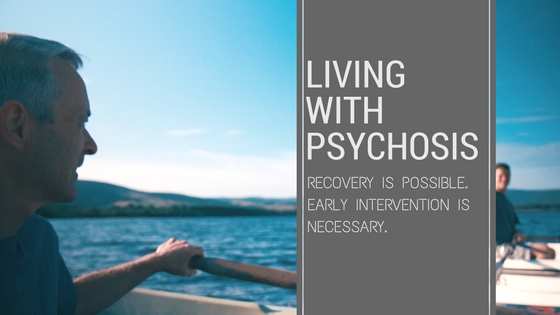
The stress of everyday life is challenging enough, but imagine living with an additional, serious mental health difficulty.
Suppose for some reason you became unable to recognise reality. This experience of loss of reality is the characteristic feature of the mental state called psychosis.
In health, we rely upon our sight, our hearing, our taste, our touch and even our sense of smell. We depend upon these senses to faithfully describe our environment. In psychosis, these senses actually misinform us, and this misinformation changes our appreciation of reality. The sensory experiences which arise (so-called hallucinations) can be strange, grandiose, frightening, and even bizarre.
Now, try to imagine how your thinking would change if your senses misled you in this way. If your experience of ‘being’ was completely contrary to objective reality, your interpretation of the world and your beliefs would inevitably change (if only in an effort to explain your particular environment). Sensations with no external validity (so-called hallucinations) and false beliefs unshakably held (so-called delusions) are typical features of psychosis.
At least 3% of the population will experience a psychosis at some stage in their lifetime. For some, it is a limited experience that is prompted by an acute brain illness or by substance misuse. For others, it is part of an enduring or relapsing mental health disorder such as temporal lobe epilepsy, acquired brain injury, bipolar mood disorder or schizophrenia.
Of course, not all unusual sensory experiences are indicative of psychosis. Many people "hear voices" and do so without a mental health disorder. The Hearing Voices Network is part of an international movement dedicated to the recognition of this fact. Similarly, many people have unusual beliefs which they hold with intensity and despite much objective evidence. These in themselves are not an indication of a mental health difficulty or psychosis.
Stigma towards psychosis
Like every mental health diagnosis, the term "psychosis" refers to much more than a set of symptoms. It is a description of an experience which is persistent and pervasive, and one that is profoundly disturbing of overall human function. All of this makes it imperative that we try to understand why psychosis is still so misunderstood and so neglected.
Surely, part of the problem is stigma. People who experience mental health difficulties or mental ill-health are some of the most marginalised in our society. Psychotic experience is over-represented amongst the poor, the young, the homeless and those in prison. All of this goes to increase the prejudice of those who continue to alienate and misunderstand people with mental health difficulties.
Hostility towards people living with psychosis is one of the least acknowledged prejudices. This was illustrated recently by the grotesque statements of the White House Press Secretary Anthony Scaramucci who chose to castigate his Chief of Staff as a "f***ing paranoid schizophrenic". It was not surprising that the same press secretary subsequently lost his job, but, sadly, his dismissal was not hastened because of his egregious attitude towards people with psychosis.
Listen to Professor Lucey speaking about psychosis on RTÉ
RTE Radio 1 - Today With Sean O'Rourke - Living with psychosis (1)
Fear around psychosis
Another problem for people with severe mental health difficulties such as psychosis is more understandable: it is fear.
Psychosis is, by its nature, hard to understand and its content can be as frightening for families and friends as it is for people who experience its tormenting phenomena more personally. We need to address this fear with better education and more skills. If the community is to care, it needs to be helped to care. This will only be achieved with better education and more support for the best ways to give that care.
That is why at St Patrick’s Mental Health Services (SPMHS), we have been developing educational social media content about psychosis, and other mental health difficulites, through the #StillJustMe campaign. The Health Service Executive (HSE) also has an excellent publication, The Journey Together: The Carers Handbook, available for download.
Early intervention for psychosis
Perhaps the biggest problem is our collective therapeutic pessimism regarding people with psychosis and other serious mental health disorders. There is a widespread, nihilistic belief that people with psychosis cannot really be helped. This is a colossal error.
The reality is that recovery from psychosis is possible and modern, evidence-based mental health services provide the most effective ways of achieving this.
The international data showing that early intervention for psychosis is effective provides compelling proof. There are some important examples of this progress available in Ireland. The benefits have been recognised in peer-reviewed research and by service user responses. An overview of the national pilot programme for early intervention in psychosis can be seen here.
Unfortunately, the roll-out of such early intervention programmes has not kept pace with the evidence or with the need. Mental health services in Ireland for those with psychosis remain patchy, fragmented and far too difficult to access. Isolated areas of best practice do exist, but there are huge gaps. This delay in getting treatment is having a detrimental effect on recovery.
Shine advocates for services and the rights of people with enduring mental health problems in Ireland, including psychosis. One of its equivalent organisations in the United Kingdom, Rethink Mental Illness, puts it well; "If your motor car has a breakdown today, it is likely that it will be fixed today, but, if you or one of your family has a mental breakdown today it is likely to be 18 months before they receive any care".
This unacceptable situation is impacting on our capacity to deliver the full range of modern effective treatments in the 21st century. The greatest opportunity for therapeutic benefit today is through early, integrated mental healthcare. That is why we must do something about the unacceptable delays in our mental health services in Ireland.
Prof Jim Lucey
Professor Jim Lucey was Medical Director of St Patrick’s Mental Health Services (SPMHS) from 2008 to 2019, and a Consultant Psychiatrist with our team until 2023.
He is Clinical Professor of Psychiatry at Trinity College Dublin. He has been working for more than 30 years with patients experiencing mental health difficulties.
During his time with us in SPMHS, in addition to medical management, Professor Lucey specialised in the assessment, diagnosis and management of Obsessive Compulsive Disorder (OCD) and other anxiety disorders. He gave public lectures and was a regular broadcaster on mental health matters on RTÉ radio, featuring on Today with Sean O’Rourke for many years.





